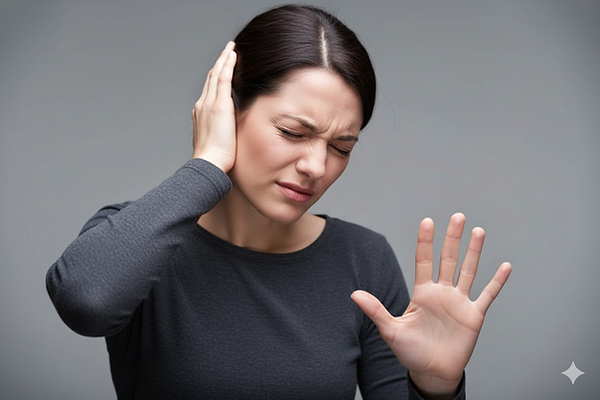
Tinnitus – Frequently Asked Questions
1. Why do I hear ringing or buzzing in my ears?
2. Is tinnitus permanent?
In many cases, tinnitus improves over time or fades once the underlying cause (like earwax or infection) is treated. However, chronic tinnitus can persist, requiring long-term management.
3. Can stress or lack of sleep make tinnitus worse?
Yes. Stress, anxiety, and poor sleep often intensify tinnitus perception. Relaxation, breathing exercises, and proper sleep can significantly reduce symptoms.
4. Will using earphones or loud music worsen tinnitus?
Prolonged use of earphones at high volume can damage hearing and worsen tinnitus. Always listen at low to moderate volume and take listening breaks.
5. How do doctors find the cause of tinnitus?
An ENT specialist examines your ears, performs a hearing test (audiometry), and may request imaging (CT or MRI) if needed to check ear structures or blood vessels.
6. Can earwax or ear infection cause ringing in the ears?
Yes. Earwax buildup or middle ear infection can trigger temporary tinnitus. Removing wax or treating the infection usually stops the noise.
7. Are there any medicines to stop tinnitus completely?
No single medicine can cure tinnitus. However, some medications may help manage associated problems like anxiety, sleep disturbance, or depression.
8. What treatments actually help reduce tinnitus?
-
Sound therapy / hearing aids to mask the noise
-
Counseling or Cognitive Behavioral Therapy (CBT) to reduce distress
-
Relaxation and lifestyle changes (reducing caffeine, alcohol, stress)
-
Treating the underlying cause like ear blockage or jaw tension
9. Is tinnitus linked to hearing loss?
Yes. Most people with tinnitus have some degree of hearing loss. Treating hearing loss with hearing aids often helps reduce tinnitus intensity.
10. When should I see an ENT doctor?
You should see an ENT if:
-
The ringing is persistent or getting louder
-
You also have hearing loss, dizziness, or ear fullness
-
The sound pulses in time with your heartbeat
11. Can tinnitus be prevented?
Yes. Protect your ears from loud noise, avoid inserting objects into your ears, manage stress, and get regular hearing checks — especially if you work in noisy environments.
12. What can I do at home to manage tinnitus?
-
Play soft background sounds while sleeping
-
Avoid silence
-
Practice relaxation techniques
-
Reduce caffeine and nicotine
-
Follow a regular sleep schedule
Tinnitus happens when your ear or brain creates sound without an external source. It may be due to hearing loss, earwax, stress, or exposure to loud noise.
Tinnitus (Ringing in the Ears)
Expert Diagnosis and Treatment at RelentCare ENT Centre, Thrissur
What is Tinnitus?
Tinnitus is the perception of sound in the ears without any external source. It may sound like ringing, buzzing, humming, hissing, or roaring.
While occasional tinnitus is common, persistent tinnitus can interfere with sleep, focus, and emotional well-being.
At RelentCare ENT Centre, we offer advanced evaluation and evidence-based treatments to help you manage and relieve tinnitus effectively.
Common Symptoms
-
Ringing, buzzing, or roaring sounds in one or both ears
-
Constant or intermittent noise
-
Variation in loudness or pitch
-
Sleep disturbance and poor concentration
-
Worsening symptoms during stress or fatigue
If the sound pulses in time with your heartbeat (pulsatile tinnitus), medical evaluation is especially important.
Common Causes
Tinnitus can occur due to several reasons, including:
-
Hearing loss (age-related or noise-induced)
-
Loud noise exposure (concerts, machinery, earphones)
-
Earwax buildup or ear infections
-
Certain medications (aspirin, antibiotics, chemotherapy drugs)
-
Jaw joint (TMJ) problems
-
Head or neck injuries
-
Circulatory problems or high blood pressure
-
Inner ear disorders such as Ménière’s disease
Sometimes, tinnitus occurs without any identifiable cause.
Diagnosis
Our ENT specialists perform a complete ear, nose, and throat examination along with:
-
Hearing tests (audiometry)
-
Ear canal and eardrum evaluation
-
Imaging (CT/MRI) for pulsatile tinnitus or structural issues
-
Assessment for TMJ or neck muscle tension
These help identify the cause and guide a customized treatment plan.
Treatment Options
While there’s no single permanent cure, several proven methods can greatly reduce tinnitus intensity and its impact on your life:
1. Treating the Cause
-
Removing impacted earwax
-
Treating infections or TMJ disorders
-
Adjusting or changing medications
2. Sound Therapy
-
Hearing aids to amplify environmental sounds
-
White noise or sound generators for masking tinnitus
-
Smartphone-based sound therapy apps
3. Counseling & Behavioral Therapy
-
Tinnitus Retraining Therapy (TRT) combines sound therapy and counseling
-
Cognitive Behavioral Therapy (CBT) to manage stress and negative thoughts
-
Relaxation techniques and lifestyle advice
4. Medications
Although no specific medicine cures tinnitus, anti-anxiety or antidepressant medications can help improve sleep and reduce emotional distress.
When to Consult an ENT
Seek medical advice if you experience:
-
Persistent ringing lasting more than a week
-
Hearing loss or dizziness
-
Pulsating sounds in sync with heartbeat
-
Tinnitus after loud noise exposure or head injury
Early intervention can prevent worsening and improve comfort.
Why Choose RelentCare ENT Centre
At RelentCare ENT Centre, Kolazhy, Thrissur, we offer:
-
Expert ENT evaluation by Dr. Salison Salim Panicker
-
Advanced diagnostic facilities
-
Personalized tinnitus management and counseling
-
A calm, supportive environment for long-term care
Book Your Appointment
📍 RelentCare ENT Centre, Kolazhy, Thrissur
📞 Call or WhatsApp: 9746351090
🌐 Visit: www.relentcarehospitals.com






